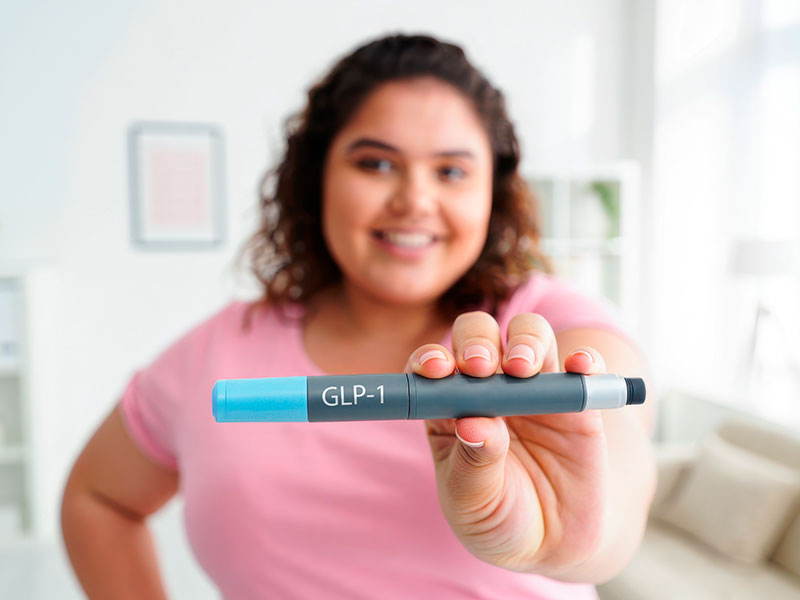Authored by The Rx Advocates, / Medically Reviewed by Dr. Conor Sheehy, PharmD, BCPS
Last Updated: November 2025
Managing diabetes, a condition that affects millions of people each year, often means juggling multiple daily medications, frequent blood sugar checks, and careful attention to timing. For people who rely on long-acting insulin, this typically means daily injections to maintain steady blood sugar levels throughout the day and night.
Recently, a new option has become available that changes this routine significantly. Insulin Icodec, marketed as Awiqli, represents the first once-weekly basal insulin approved for use in adults with diabetes.
This development offers a different approach to insulin therapy that may simplify treatment schedules for some patients. Understanding how this new weekly insulin compares to established daily options like Tresiba and Levemir can help you have more informed discussions with your healthcare provider about what might work best for your specific situation and lifestyle needs.
Understanding Insulin Icodec (Awiqli)
Awiqli is a long-acting basal insulin designed to provide blood sugar control for seven days with a single weekly injection. Like other insulins, it mimics the insulin your body naturally produces, but it has been specifically engineered to remain active in your system for an extended period.
This medication works by helping your body maintain steady blood sugar levels between meals and overnight. It’s designed to provide the background insulin coverage that people with diabetes need, similar to how a healthy pancreas would continuously release small amounts of insulin throughout the day.

Awiqli is approved for adults with both Type 1 and Type 2 diabetes. For people with Type 1 diabetes, it must always be used alongside short or rapid-acting insulins for mealtime coverage.
For those with Type 2 diabetes, it can be used alone or combined with other diabetes medications, including mealtime insulins. The most significant difference between Awiqli and other long-acting insulins is the dosing schedule.
While traditional basal insulins require daily injections, Awiqli is administered once weekly on the same day each week. This represents a substantial change in how insulin therapy can be managed.
The medication comes in a pre-filled pen that allows for dose adjustments in 10-unit increments, ranging from 10 to 700 units per injection. The pen is designed for subcutaneous injection into the thigh, upper arm, or abdomen, with injection sites rotated to prevent skin problems.
Important limitations include that Awiqli cannot be used in insulin pumps, should not be mixed with other insulins, and cannot be used alongside other long-acting basal insulins.
How Awiqli Compares to Daily Long-Acting Insulins
When comparing Awiqli to established long-acting insulins like Tresiba (insulin degludec) and Levemir (insulin detemir), several key differences emerge that may influence treatment decisions.
Dosing Schedule Differences
The most obvious difference is frequency of administration. Tresiba and Levemir are typically injected once daily, though some patients may require twice-daily dosing with Levemir depending on their individual needs.
Awiqli, by contrast, is injected once weekly. This difference in dosing frequency can have practical implications for medication adherence.
Some patients may find it easier to remember a weekly injection, while others prefer the routine and control of daily dosing. The weekly schedule might be particularly beneficial for people who travel frequently or have irregular schedules that make daily medication timing challenging.
However, the weekly dosing also means that if a dose is missed, the coverage gap is potentially longer. The manufacturer provides specific guidance for missed doses, emphasizing that there should be at least four days between injections to maintain safety.
Effectiveness and Blood Sugar Control
All three insulins are designed to provide steady basal insulin coverage, but they achieve this through different mechanisms and durations of action. Tresiba is known for its ultra-long duration of action, providing coverage for more than 24 hours with consistent blood sugar control.
Levemir typically provides 18-24 hours of coverage. Awiqli is designed to maintain insulin levels for seven days, though the effectiveness may vary between individuals.
Like any insulin therapy, blood sugar monitoring remains essential to ensure adequate control and to adjust dosing as needed. The transition between different long-acting insulins requires careful medical supervision. When switching to Awiqli from a daily basal insulin, healthcare providers may recommend a modified first dose, followed by standard weekly dosing thereafter.
Safety Profiles and Side Effects
All long-acting insulins carry similar risks, with hypoglycemia (low blood sugar) being the most common and potentially serious side effect. The risk factors for low blood sugar are similar across all insulin types, including taking too much insulin, eating less than usual, drinking alcohol, or exercising more than normal.
Awiqli’s weekly dosing schedule presents unique considerations for managing hypoglycemia. Because the insulin remains active for seven days, any dosing adjustments or management of blood sugar fluctuations need to account for this extended duration of action.
Common side effects for all these insulins include injection site reactions such as redness, swelling, or itching. Awiqli may also cause peripheral edema (swelling in the ankles and feet) and carries the same warnings about potential allergic reactions as other insulin products.
The longer duration of Awiqli means that if side effects occur, they may persist longer than with daily insulins.
Practical Considerations for Patients
Switching between different types of long-acting insulin is not something that should be done without medical supervision. Each insulin has different onset times, peak effects, and durations of action that require careful consideration when transitioning between products.
Healthcare providers typically oversee insulin switches with close monitoring of blood sugar levels and potential dose adjustments. Monitoring is particularly important with Awiqli because of its seven-day duration of action and the potential need for a modified first dose when transitioning from daily insulin.
Cost considerations may play a role in insulin selection. As a newer medication, Awiqli may have different insurance coverage compared to established insulins like Tresiba or Levemir.
Some insurance plans may require prior authorization or have higher copayments for newer medications. Storage requirements are similar for all three insulins, requiring refrigeration before first use and protection from extreme temperatures.
However, the weekly dosing of Awiqli means that patients need to plan differently for travel or situations where refrigeration might not be readily available. The injection technique and pen devices may differ between products.
While all three use similar subcutaneous injection methods, the specific pen designs and dose selection mechanisms vary. Patients need proper training on whichever device they’ll be using. Patients who benefit most from weekly dosing include those with adherence challenges to daily medications, frequent travelers, or individuals whose lifestyles make daily injection timing difficult.

Making Informed Decisions About Your Insulin Treatment
Choosing the right long-acting insulin involves multiple factors that should be discussed thoroughly with your healthcare provider. These include your current blood sugar control, lifestyle factors, other medications you’re taking, and your comfort level with different dosing schedules.
Your healthcare provider will consider your individual diabetes management goals, how well your current treatment is working, and any challenges you’re experiencing with your current insulin regimen. They’ll also take into account your kidney and liver function, as these can affect how your body processes insulin.
Factors that influence insulin choice include the stability of your daily routine, your experience with self-injection, your ability to monitor blood sugar levels regularly, and how well you respond to different insulin formulations. Some people achieve better blood sugar control with certain insulin types, while others may have fewer side effects with specific formulations.
Regardless of which long-acting insulin you use, consistent blood sugar monitoring remains essential. This helps ensure that your insulin dose is appropriate and allows for timely adjustments when needed. Your healthcare provider will establish a monitoring schedule that’s appropriate for your specific situation.
The goal of any insulin therapy is to help you achieve target blood sugar levels while minimizing the risk of hypoglycemia and fitting reasonably into your lifestyle. This requires ongoing communication with your healthcare team and willingness to make adjustments as your needs change over time.
Remember that insulin therapy is just one component of comprehensive diabetes management. Proper nutrition, regular physical activity, stress management, and other aspects of self-care all contribute to successful diabetes control regardless of which insulin you’re using.
Let The RX Advocates Help With Your Prescribed Insulin Medications
Managing diabetes effectively requires consistent access to your prescribed medications, but the cost of insulin can be a significant barrier for many people. Whether you’re prescribed Awiqli, Tresiba, Levemir, or other insulin types, The RX Advocates can help make these essential medications more affordable.
Our patient assistance program works directly with pharmaceutical companies to help eligible individuals access their prescribed insulin at reduced costs or sometimes at no cost. We understand that insulin is not optional for people with diabetes, and financial concerns should never interfere with proper diabetes management.
The application process involves working with our team to determine your eligibility and connect you with appropriate assistance programs. We handle the paperwork and coordinate with manufacturers to streamline access to the medications you need.
If you’re struggling with the cost of your insulin medications, contact The RX Advocates at 844-559-8332 to learn about your options. Our goal is to help ensure that effective diabetes treatment remains accessible and affordable, regardless of which insulin therapy your healthcare provider has prescribed.

